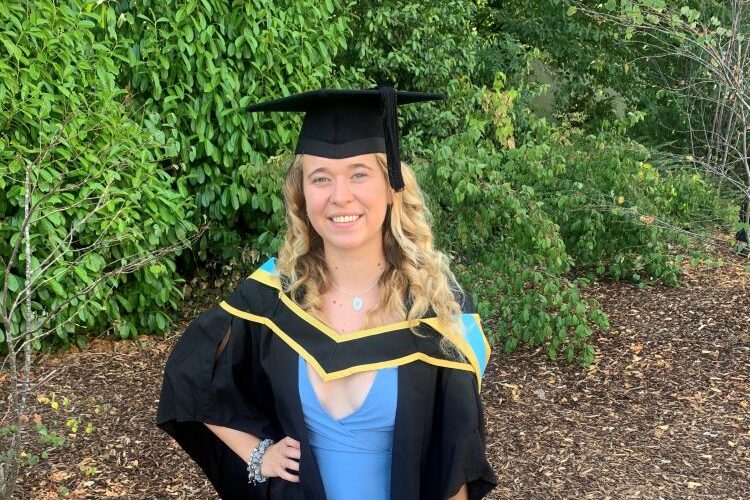
Ella Bailey's story
Meningitis Research Foundation Ambassador Ella contracted meningitis at thirteen months old. She shares her experience to help raise awareness.
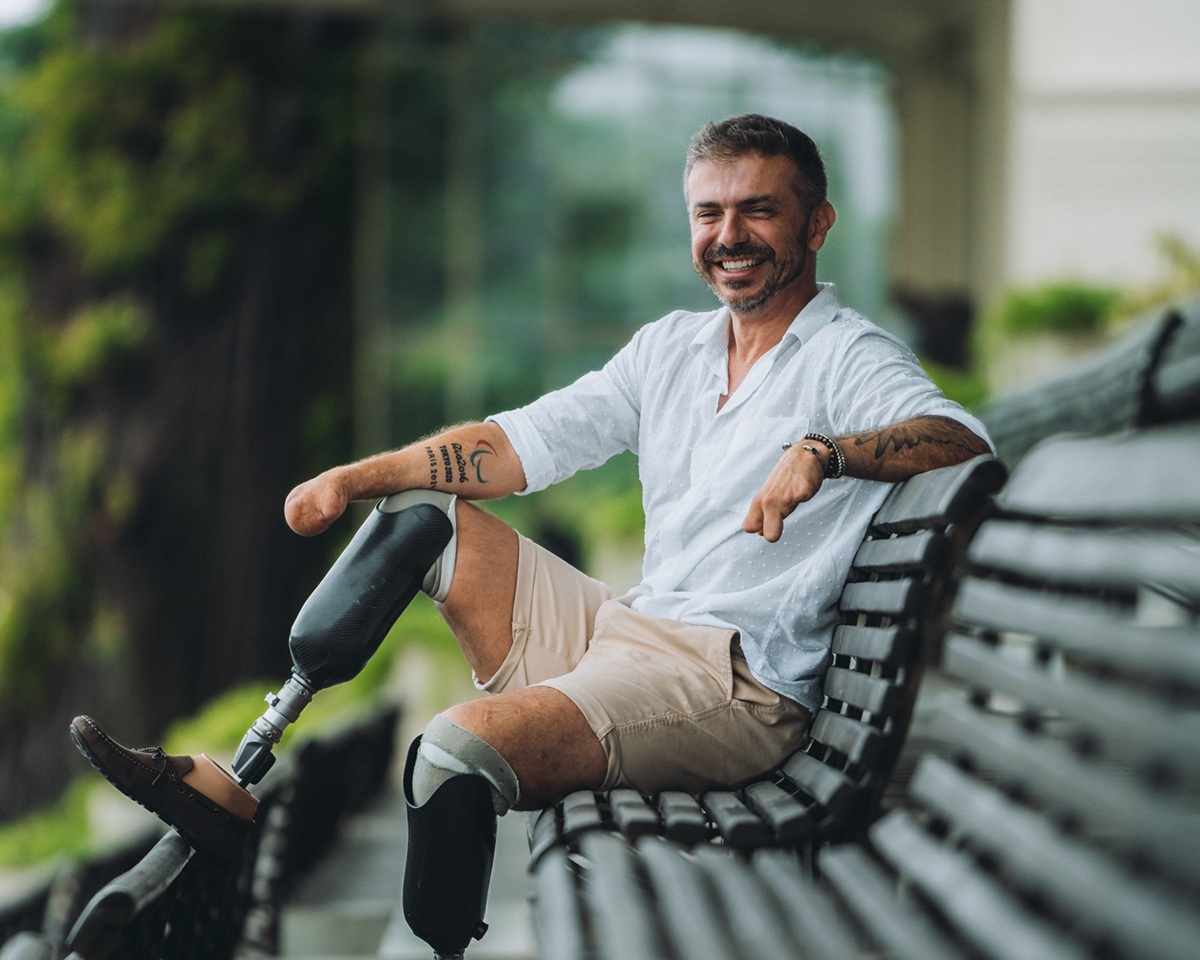
Horse rider and Paralympian Rodolpho shares his experience with bacterial meningitis and living with multiple amputations.
Hello, my name is Rodolpho, and I am originally from Sao Paulo in Brazil. I’m very passionate about horses and riding – it’s a big part of my life. I started to ride horses young and soon became involved in dressage sport. I rode at every level growing up: juniors, young riders, seniors.
Coming from an equestrian family, they started me in the sport when I was six years old. My grandfather had horses; then, my mom was a trainer, a national dressage judge and competed as well. From the start, I fell in love with the equestrian sport and the competition. When I was fourteen, my parents sent me to Paris for the summer to learn French and get some experience riding other horses and working in a dressage stable. I went back several more times, as well as going to Belgium and Germany.
By the time I was sixteen, I was working as a professional rider and competed in and won many youth and senior competitions, such as the Brazilian Championship, the South American Championship, and the World Cup.
In 2012, at the age of 28, I moved to a city near Paris, France, to work as a head trainer, rider, and manager of a private stable. Two years later, I wanted to try something new and decided to change careers. I was hired by a French Fashion house where I still work to this day. In my free time, I continued my athletic career.
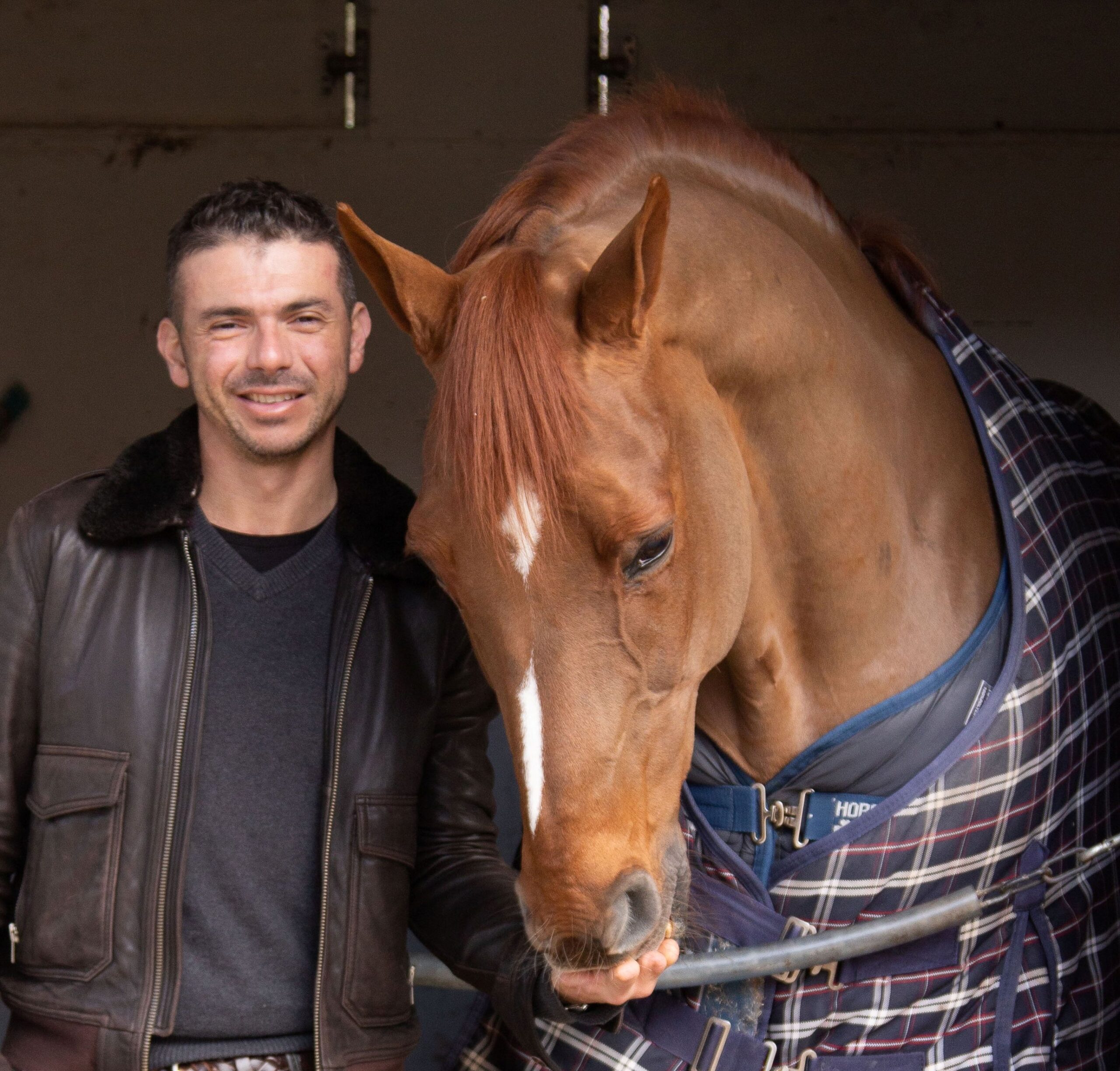
In the summer holidays of 2015, my mum called me to say that my dad was in the hospital. I wasn’t able to fly back to Brazil immediately, and unfortunately, my dad passed away before I could get back to Brazil. My mum and sister decided not to tell me by phone, only face-to-face once I arrived back in Sao Paulo. As you can imagine, it was a difficult time for our family. I felt like I needed to stay for a couple of weeks to help with the paperwork and get things done.
Around ten to fifteen days later, I visited the lawyer in the morning, had some lunch, and gave a riding lesson at the club for a friend. Everything was fine during the day, but I got home around four and I started to feel sick. It felt like I had the flu. My mum made dinner, but I wasn’t able to eat anything. Soon, I had a fever. In about three or four hours, it was 40deg C. Also, I was vomiting. I took some pain killers and went to bed.
The next morning, I was feeling even worse. My legs and neck were hurting a lot. My mum was, of course, very worried. She’d just lost my dad, and now I was suddenly very sick. She drove me directly to hospital. I don’t remember everything that happened once I got there. One thing I do remember very clearly is looking down at my hands and seeing red spots on them. I learned that this was purpura, a rare and severe complication of meningococcal septicaemia, because of clotting in the blood vessels. I also remember they took spinal fluid twice and blood from my wrist, which hurt like hell.
The doctors and nurses at the hospital moved very quickly because they knew something was very wrong with me. I’m lucky that they knew what they were looking for because I was diagnosed with bacterial meningitis that day. And I was very lucky that my mum had brought me to the hospital very quickly because bacterial meningitis strikes fast and moves faster.
I don’t remember a lot of what happened over the next few days. Because I was having difficulty breathing, the doctors decided to put me into a medically induced coma. I later learned that while I was in a coma, the skin on my arms up to my shoulders was red and black from lack of blood flow. My legs were also red and black up past my knees. The doctors told my mum that it was best to amputate my legs above the knee. They said they’d try to save as much of my arms as they could. My mum didn’t want them to amputate anything, so she insisted that they continue to treat me, but not amputate any limbs at that moment.
Apparently, there was one night while I was in the coma that required the doctors and nurses to do everything they could to keep me alive. They had to give me emergency care several times, and someone stayed by my bed for over 24 hours. But once I got through that night, my condition started improving. After another week of being kept in a coma, they decided to bring me out of it. Unfortunately, I didn’t wake up and it took me another week to finally come out of the coma.
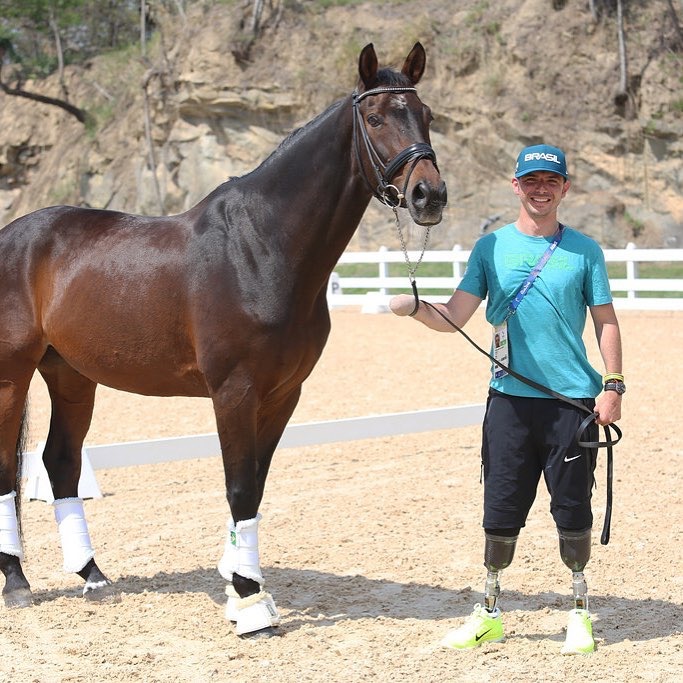
By the time I finally woke up, the nurses had wrapped my hands, arms, and legs so that I wouldn’t be able to see them until the doctors had a chance to explain what had happened to me. They told me that I would need to have surgeries to see the degree of damage to my extremities and that amputation was a big possibility. Hearing the diagnosis and seeing my limbs, should have shocked me, but surprisingly, it didn’t. I had heard them talking about meningitis before the coma, and I think I even heard what people were saying around me while I was in the coma, because I have flashes of memories from that time.
I didn’t know much about meningitis before, but I now know that meningitis is swelling around the nerves in the brain and spinal cord. I had thought that I was fully protected against it because I’d had a meningitis vaccination when I was a child. I didn’t know that there was more than one kind of meningococcal meningitis and that two different types of vaccines are needed to ensure the best protection against the common types of meningococcal meningitis.
By September, after a month in the hospital, I was stable enough to be transported back to France. My insurance would cover the treatment in France better than it did in Brazil. I was transported on a specially designed private plane that was set up with a hospital bed and the necessary equipment. I had always wanted to fly on a private jet, but I just never imagined it would be in these circumstances! A doctor and a nurse flew from France to Brazil to take care of me during the flight. And of course, my mum came with me back to France to stay by my side.
Once I was back in France, the doctors performed surgery to see how extensive the damage was. We talked with the doctors about amputation and the option of trying to preserve my feet by taking flesh from my legs and back. For me, this was the most difficult part because up until this point, I still had a shred of hope. I hoped for a miracle, but when we realized how extensive the damage truly was, the decision I had to make was clear to me. By that time, I was sick of being in hospitals. I had been in the hospital for almost two months – I needed to get out and try to get back to normal life. So, I opted to have the amputations.
In October 2015, at the age of 30, I had both legs amputated below the knees as well as my fingers and portions of both palms of my hands. In November, I was finally transferred to a rehabilitation centre where I would spend the next six months. I still remember the day I arrived at the centre; they came into my room with a wheelchair and I think because the wheelchair is often the symbol of disability, it really shocked me. And in that moment, reality smacked me in the face. They told me that I needed to heal before I could be fitted with prosthetic legs and learn how to walk again. But not only did I have to learn how to walk, I had to relearn everything: how to write, how to get dressed, even how to take a shower.
On 2nd January, I visited one of the horses I was riding before I got sick. The owner joked that I could ride whenever I wanted. I joked back and said, “Yes, I want to now!” Keep in mind, I was still in a wheelchair at this point, but a few minutes later, I was in the saddle.
I was nervous about riding with no lower legs. When you play a sport for so many years, and then your body changes so much, that’s really hard. I wasn’t sure what the feeling would be and what could happen but it was perfect. Once I was on the saddle, everything clicked. I knew I could do this again.
Beforehand, I had been thinking about trying out for the Brazilian equestrian team to compete in the Olympic games that would be held in my home country, in Rio de Janeiro. But meningitis happened, and my life got turned upside down. After I had this first ride, I said to myself, “Not an Olympian. But why not a Paralympian?” Later that month, I started the process to qualify.
When I told my mum my new goal of being a Paralympian, she was completely supportive. My mum, along with my sister, has given me all the support I could ever need to make my dream come true. Sure, everyone also thought that I was crazy though, because I had nearly died a few months before and I wasn’t totally healed yet. But the first qualifying event was in April. I went and tried out. It went really well. That’s when I realized that living my life and doing what I wanted after meningitis was possible.
In the next few months, even though I was still in the rehab centre during the first two qualifications, I was selected to represent Brazil in the 2016 Paralympic Games. It was an amazing experience to be part of one of the most important sports events. It is always an honour to represent my country. I finished tenth individually at the games.That same year, I was awarded the “Against All Odds” prize from the Federation Equestre Internationale.
In 2018, I started to compete again in able-bodied competitions together with para events. At the World Championships that year in North Carolina, USA, I got two individual silver medals and became number one on the World Ranking list. In 2021, I won the individual silver medal at the Tokyo Paralympic Games. In 2022, I was again on the podium with two bronze medals at the World Championships in Denmark and most recently 7th place in the Paris 2024 Paralympic Games. It’s unbelievable to have accomplished all that over the last few years, and an amazing reward not only for me but for my family and my team.
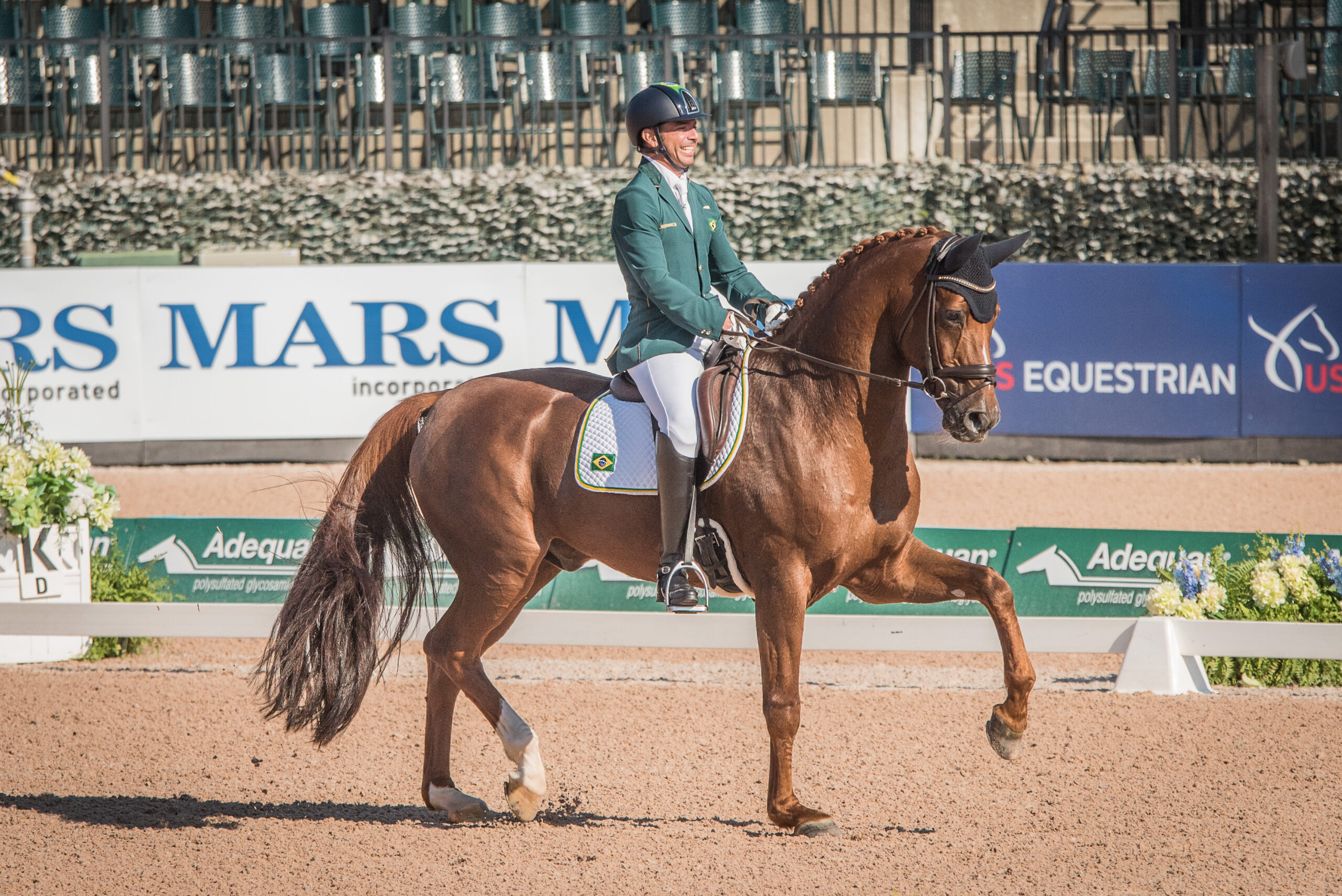
My life took an unexpected turn in 2015. I don’t think I’ll ever find out how I contracted meningococcal meningitis. I was lucky that I was with my family in Brazil when it happened because I don’t think I would have gone to hospital if I had been at home alone in Paris. That’s why it’s so important to prevent this disease because it’s easy to miss and many don’t realize how serious the situation is until, sadly, it’s too late.
I often say that meningitis was my 'merveilleux malheur', as we say in French, or my wonderful misfortune. I like to believe that no matter what happens to us in life, there is always a way to continue forward. If I've learned anything from all this, it is that we can push ourselves to keep going. We're much stronger than we think.
One story can change a life. 2,030 could change the world. Share yours today.

Meningitis Research Foundation Ambassador Ella contracted meningitis at thirteen months old. She shares her experience to help raise awareness.
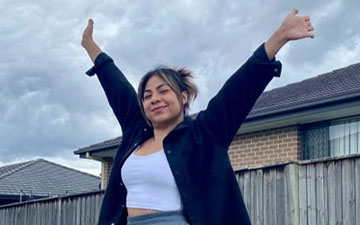
Model and social media influencer Juttima shares the story of losing both of her legs after contracting meningococcal septicaemia in 2018.
Featured

Horse rider and Paralympian Rodolpho shares his experience with bacterial meningitis and living with multiple amputations.